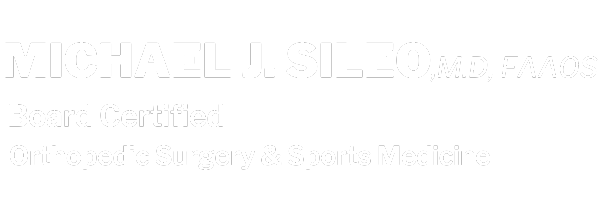About Our Long Island Sports Medicine
Dr. Sileo is interested in caring for both competitive and recreational athletes. He specializes in the arthroscopic and minimally invasive treatment of shoulder, hip, and knee injuries but has vast experience in most areas of both operative and
Finding Relief: Dr. Michael J. Sileo’s Guide to Treatment Options for Shoulder Impingement
Shoulder impingement is common among athletes and individuals with physically demanding lifestyles. It can be painful and debilitating, affecting your daily activities and sports performance. However, there’s hope. Visit our website to learn more about Long Island Sports Medicine.
 Meet Dr. Michael J. Sileo – Your Expert in Long Island Sports Medicine.
Meet Dr. Michael J. Sileo – Your Expert in Long Island Sports Medicine.
Regarding Long Island sports medicine, Dr. Michael J. Sileo is a trusted name. Dr. Sileo is a renowned orthopedic surgeon with years of experience and a commitment to providing the best possible care to his patients. His expertise in treating sports-related injuries, including shoulder impingement, makes him a sought-after professional.
Understanding Shoulder Impingement
Before delving into treatment options, it’s essential to understand what shoulder impingement is. Dr. Michael J. Sileo explains that shoulder impingement occurs when the rotator cuff tendons in the shoulder become compressed or irritated as they pass through the narrow space beneath the acromion, a part of the shoulder blade. This compression can lead to pain, inflammation, and limited shoulder mobility.
Non-Surgical Treatment Options
For many individuals with shoulder impingement, non-surgical treatment options can provide significant relief. Dr. Michael J. Sileo highlights some of these approaches:
- Rest and Activity Modification: Giving the shoulder adequate rest and avoiding activities that exacerbate the pain can allow the inflammation to subside.
- Physical Therapy: A structured physical therapy program can help strengthen the shoulder muscles and improve the range of motion, reducing the risk of impingement.
- Anti-Inflammatory Medications: Nonsteroidal anti-inflammatory drugs (NSAIDs) can help alleviate pain and reduce inflammation.
- Corticosteroid Injections: In some cases, corticosteroid injections into the shoulder joint can temporarily relieve pain and inflammation.
- Lifestyle Changes: Dr. Sileo may recommend adjustments to your daily activities and posture to prevent further shoulder irritation.
Surgical Intervention for Shoulder Impingement
While non-surgical options are often the first line of defense, some cases of shoulder impingement may require surgical intervention. Dr. Michael J. Sileo explains that surgical treatment is typically considered when conservative methods have failed to provide relief or when there is significant structural damage to the shoulder. Surgical options include:
- Arthroscopy: Arthroscopic surgery is a minimally invasive procedure in which small incisions are made to access and repair the damaged tissues in the shoulder. It is a popular choice for treating shoulder impingement.
- Subacromial Decompression: This procedure involves removing a small portion of the acromion to create more space for the rotator cuff tendons, reducing compression.
- Rotator Cuff Repair: Surgical repair may be necessary to restore function and alleviate impingement if the rotator cuff tendons are torn.
Dr. Sileo’s extensive experience in Long Island sports medicine enables him to determine the most suitable surgical approach for each patient, ensuring the best possible outcome.
Long Island Sports Medicine
Shoulder impingement can be a painful and limiting condition, but with the guidance of an expert like Dr. Michael J. Sileo, effective treatment options are available. Whether through non-surgical methods or surgical intervention, relief from shoulder impingement is within reach. Don’t let shoulder pain hold you back from your daily activities or sports performance – consult with Dr. Sileo, a leading expert in Long Island sports medicine, and embark on a path to shoulder health and pain-free living.
Common Shoulder Injuries in Athletes and How to Prevent Them
Athletes, whether professional or recreational, put immense strain on their shoulders, making them prone to various injuries. Understanding these common shoulder injuries and how to prevent them is crucial for maintaining long-term athletic performance. Dr Sileo is a professional! Contact us today!
Common Shoulder Injuries in Athletes
- Rotator Cuff Tears
- Cause: Overuse or acute trauma.
- Symptoms: Pain, weakness, and limited range of motion.
- Treatment: Rest, physical therapy, or surgery.
- Shoulder Impingement
- Cause: Repetitive overhead movements.
- Symptoms: Pain during arm lifting, reduced strength.
- Treatment: Anti-inflammatory medications, physical therapy, or arthroscopic surgery.
- Labral Tears
- Cause: Dislocations or repetitive shoulder motions.
- Symptoms: Catching or locking sensation in the shoulder.
- Treatment: Physical therapy or surgery.
- Shoulder Dislocations
- Cause: Trauma or extreme rotation.
- Symptoms: Visible deformity, intense pain, inability to move the shoulder.
- Treatment: Reduction (repositioning the bone), immobilization, and rehabilitation.
Prevention Strategies
Preventing shoulder injuries is crucial for athletes to maintain their performance and avoid long-term damage. As a Long Island sports medicine expert, Dr. Michael Sileo emphasizes the following prevention strategies:
- Strengthening Exercises: Focus on building the rotator cuff and scapular muscles to stabilize the shoulder.
- Proper Warm-Up: Always warm up before activities to increase blood flow and flexibility.
- Correct Technique: Ensure proper form and technique, especially in overhead sports like swimming, tennis, and baseball.
- Rest and Recovery: Allow sufficient time for recovery between training sessions to avoid overuse injuries.
- Regular Check-Ups: Periodic evaluations by a Long Island sports medicine specialist can detect early signs of injury and provide preventative care.
When to See a Specialist
Despite the best prevention efforts, injuries can still occur. If you experience persistent shoulder pain or discomfort, it’s essential to consult a Long Island sports medicine professional. Early diagnosis and treatment can prevent further damage and ensure a faster recovery.
Long Island Sports Medicine
Shoulder injuries are a common concern for athletes, but with the right prevention strategies and timely intervention, they can be managed effectively. Dr. Michael Sileo, a trusted Long Island sports medicine expert, is dedicated to helping athletes stay healthy and perform at their best. By following these guidelines and seeking professional care when needed, you can protect your shoulders and enjoy a long, active, athletic career.



 Meet Dr. Michael J. Sileo – Your Expert in Long Island Sports Medicine
Meet Dr. Michael J. Sileo – Your Expert in Long Island Sports Medicine